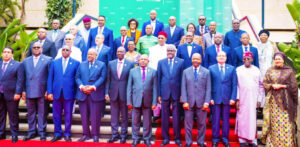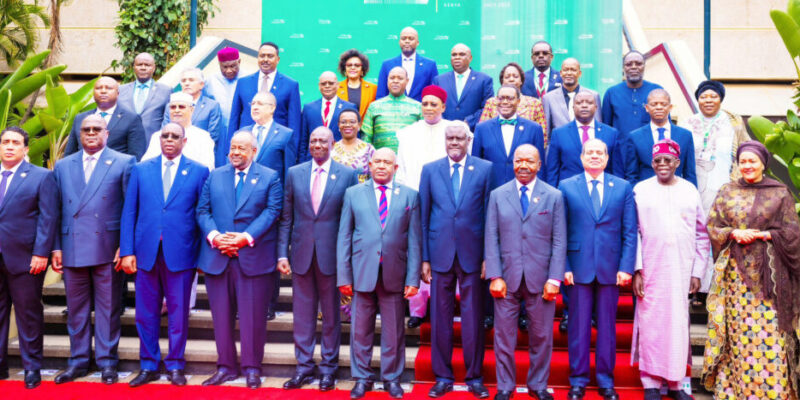
Tinubu addressed the African Union (AU), Regional Economic Communities (RECs), Regional Mechanisms (RMs), and African Union Member-States during the Fifth Mid-Year Coordination Meeting (5thMYCM). The Nigerian leader urged effective governance to secure a prosperous future for Africa free of past exploitations.
“As Africans, we forge ahead regardless of the barriers thrust before us,” President Tinubu remarked. “The world we live in can often be cruel and uncertain. Our recent history and contemporary global challenges argue against our future success.
”Lessons of the past few years teach us that the world economy can be disrupted in ways that halt progress and invite downturn. Our nations can suddenly find themselves in dire situations if we choose to be passive observers of our fate.
”Such passivity does not commend itself to me. I will not listen to it. Neither should any African. The challenges we face mean that governance will be difficult.
”They also mean that visionary good governance is necessary. Some observers assert a new scramble for Africa is afoot and it is much like the old scramble that plundered our continent.
”But, here and now, let it be said to whomever the new scramblers might be that our continent may be old but our spirit is new. And it is strong. The bad that took place in the past must stay there. It shall never be repeated.”
According to Dele Alake, Special Adviser to the President (Special Duties, Communications, and Strategy), in his address titled “Address on the Status of Regional Integration in ECOWAS,” Tinubu announced plans to strengthen the ECOWAS Standby Force to deter coups and combat terrorism in the sub-region.
In his capacity as Chairperson of the ECOWAS Authority of Heads of State and Government, the president noted ECOWAS’s success in numerous areas of its integration process, including trade, free movement of people, investment promotion, infrastructure development, and security.
He emphasized the importance of Africa overcoming its issues and working toward a prosperous future by focusing on inclusive growth, good governance, and capitalizing on the opportunity afforded by the African Continental Free Trade Agreement (AfCFTA).
President Tinubu highlighted the sub-regions concerns in terms of peace, security, and stability, including terrorism and anti-constitutional changes in government.
”We sit here in meaningful discussion of vital economic matters. Yet, it will be impossible to bring full meaning to what we attempt unless we give due consideration to the instability and conflict that now scar many of our nations.
”The fullness of the integration we seek will elude us as long as several of our nations stand amid violence and war.
”The trade and commerce we talk of today refers to valued goods and services that improve life. The trade and commerce these nations suffer is of destruction and disorder that takes lives and steals opportunity.
”We cannot integrate Africa and attain the prosperity we seek while our nearby brothers and sisters suffer in pain and anguish, they should not suffer. We must advance as one continent toward peace and prosperity.
”Otherwise, we risk the creation of two or more Africa, one a select group of nations moving steadily while the rest remain trapped in the age-old mire of poverty, conflict and lack of hope.
”It is very clear that in the area of peace, security, and stability, our region is confronted with the twin challenges of terrorism and reversal of democratic gains through undemocratic changes of Government.
”To address these challenges, the ECOWAS Authority, which I have the honour to chair, has given directive regarding the enhancement of the role of the ECOWAS Standby Force for deployment to fight terrorism and undemocratic changes in government.
”The Authority has also resolved to raise our funding internally to finance the peace support operations in our community. Meanwhile, we have continued to monitor the transition programmes in Mali, Burkina Faso, and Guinea,” he said.
President Tinubu recalled that at the recently ended ECOWAS Summit in Bissau, West African leaders determined to continue working with Mali and Burkina Faso to diligently implement the 24-month transition timelines agreed with ECOWAS.
Nonetheless, he stated that ECOWAS had resolved to assist Burkina Faso and Mali in protecting their territory from terrorist occupation.
He urged foreign partners to help offer essential assistance to facilitate the restoration of democratic order in these Member-States.
In terms of trade, President Tinubu stated that ECOWAS had achieved the Free Trade Area and was striving to construct the Customs Union and Common Market.
However, he voiced concern about the low amount of intra-community commerce among member countries, adding that the European Union remains the region’s largest economic partner, followed by Asia, North America, and the rest of Africa.
The Nigerian leader emphasized ECOWAS’ efforts to cement the achievements of its trade liberalization plan and promote the AfCFTA’s implementation, saying the ECOWAS Commission has been aiding member-states in the negotiations, ratification, and implementation of the AfCFTA.
He stated that the deal has been ratified by 13 of the 15 ECOWAS member states.
Concerning the free movement of individuals, President Tinubu reminded the gathering that ECOWAS had begun efforts to adopt the Harmonized Visa Regime (ECOVISA) to ease the free movement of non-ECOWAS citizens.
President Tinubu underlined ECOWAS’ priority on regional infrastructure development, notably the Lagos-Abidjan Corridor Highway, to encourage economic activity and integration.
”The Feasibility and Preliminary Design and Studies show a significant investment cost of nearly US$15 billion for the whole highway with an average economic rate of return of 15% per annum. In the same vein, preparations are underway for the development of the other corridors, namely the Abidjan-Praia-Dakar,” he said.
Concerning intra-regional cooperation, the President informed the gathering that a joint border post between Nigeria and Cameroon was recently commissioned and would be handed over to the two countries authorities in November 2022.
He regarded the project as a link between ECOWAS and ECCAS, as well as a solid platform for future cooperation and integration between the two organizations and, eventually, the African continent.
President Tinubu also presented an update on the energy sector, expressing his joy after many generation and interconnection projects in the region.
According to him, the completion of the electric interconnection between Cote d’Ivoire-Liberia-Sierra Leone-Guinee (1,300 km) and Senegal-The Gambia-Guinea Bissau and Guinea (1,700 km) has now connected all 15 West African countries.
”The completion of the Information and Coordination Centre of the West African Power Pool (WAPP) will enable member-states to buy and sell electricity in the region as this centre will act as a regional system operator within the framework of the regional electricity market,” he said.
The ECOWAS chairwoman also gave updates on investment promotion, the ECOWAS Cybersecurity Agenda, and member states’ cybersecurity capabilities.
President Tinubu acknowledged his honour to attend the AU Mid-Year Meeting for the first time as Chairperson of the ECOWAS Authority of Heads of State and Government.
President Tinubu congratulated the Government and people of the Republic of Kenya for hosting the meeting and providing good facilities for the attendees while commending the AU for their efforts in increasing collaboration and coordination between the continental and regional bodies.

Comments